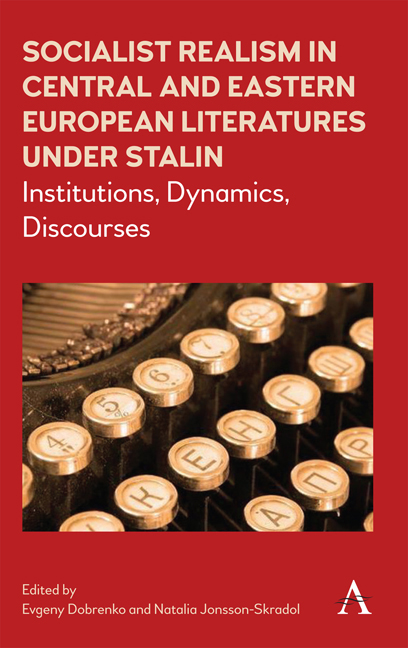 Socialist Realism in Central and Eastern European Literatures under Stalin
Socialist Realism in Central and Eastern European Literatures under Stalin Book contents
- Frontmatter
- Contents
- Acknowledgements
- Introduction
- Part 1 Institutions
- Part 2 Dynamics
- 8 Socialist Writers and Intellectuals in a Divided Nation: The Early GDR Experience
- 9 Stalinism's Imperial Figure: Hero or Clerk of the Pax Sovietica?
- 10 From Avant-Garde to Socialist Realism: Continuities and Discontinuities in Hungarian and Romanian Literature
- 11 The Short Life of Socialist Realism in Croatian Literature, 1945–55
- 12 Literature in Socialist Yugoslavia: Constructing Collective Memory, Institutionalizing the Cultural Field
- 13 ‘Yesterday and Tomorrow’: The Forms of the Slovak Literature of Socialist Realism, 1945–56
- 14 Socialist or Realist: The Poetics of Politics in Sovietized Hungary
- Part 3 Discourses
- Conclusion
- List of Contributors
- Index
12 - Literature in Socialist Yugoslavia: Constructing Collective Memory, Institutionalizing the Cultural Field
from Part 2 - Dynamics
Published online by Cambridge University Press: 10 May 2018
- Frontmatter
- Contents
- Acknowledgements
- Introduction
- Part 1 Institutions
- Part 2 Dynamics
- 8 Socialist Writers and Intellectuals in a Divided Nation: The Early GDR Experience
- 9 Stalinism's Imperial Figure: Hero or Clerk of the Pax Sovietica?
- 10 From Avant-Garde to Socialist Realism: Continuities and Discontinuities in Hungarian and Romanian Literature
- 11 The Short Life of Socialist Realism in Croatian Literature, 1945–55
- 12 Literature in Socialist Yugoslavia: Constructing Collective Memory, Institutionalizing the Cultural Field
- 13 ‘Yesterday and Tomorrow’: The Forms of the Slovak Literature of Socialist Realism, 1945–56
- 14 Socialist or Realist: The Poetics of Politics in Sovietized Hungary
- Part 3 Discourses
- Conclusion
- List of Contributors
- Index
Summary
Yugoslavia: A New Society
The Communist Party of Yugoslavia (CPY) came to power in 1945 but, after a short period of close cooperation with the USSR, Yugoslavia was expelled from the Soviet bloc in 1948. This event conditioned much of the development of Yugoslav society over the following decades. In its cultural policy, the relationship between the CPY's proclaimed socialist ideals and allowing for flexibility and change remained ambiguous throughout the years of the existence of the state. This chapter is specifically concerned with examining official policy towards literature in Yugoslavia, the kind of political and social engagement that was required of literature and the level of ambiguity present in cultural policy from the very early days of communist government.
In October 1944 Belgrade was liberated by partisan units (formed by the CPY in 1941) in a joint military operation with the Red Army. It is significant that Soviet armed forces were then withdrawn, as the CPY wanted to be seen as the country's sole saviour. After the war, the country was divided into six republics and two autonomous provinces with a constitution modelled on that of the Soviet Union. The Party ensured that it was in a position to control all aspects of government and the economy through the centralization of decision- making processes. It was of utmost importance that the Yugoslav communists owed their post- war position to their own military efforts and political organization, in contrast to other governments in the Soviet sphere, which were placed in a commanding position by the Red Army as they advanced through Eastern Europe. While cooperation between Belgrade and Moscow was a feature of these early years, it did not last long – for reasons that were both purely diplomatic (Stalin did not particularly like Tito's growing prestige in other countries of the region) and political (the Yugoslavs did not always mirror Soviet foreign policy where relations with their immediate neighbours were concerned). The Party retained its monopoly of political power during the post- war existence of the state, even after Yugoslavia was expelled from the Soviet bloc in 1948, and it was renamed the League of Communists of Yugoslavia (LCY) in 1952.
- Type
- Chapter
- Information
- Socialist Realism in Central and Eastern European Literatures under StalinInstitutions, Dynamics, Discourses, pp. 183 - 198Publisher: Anthem PressPrint publication year: 2018


